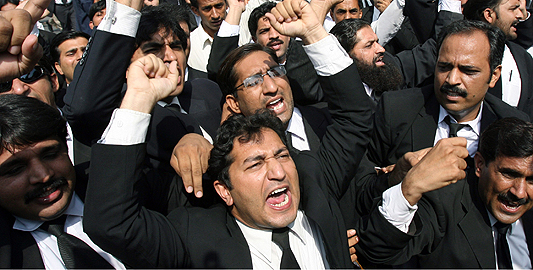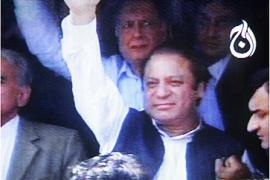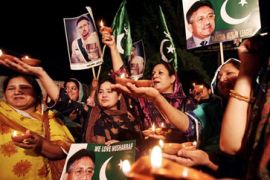 |
| Pakistan has seen unprecedented protests in the run-up to the presidential poll |
Pakistan has faced political turmoil for the past several months.
The country is set to elect a new president on Saturday, and a parliamentary poll is due in a few months.
With political power up for grabs, passions have been aroused and controversies stoked.
Amid the political uncertainty, Al Jazeera explains what is at stake and what lies ahead.
Why is the election important?
Saturday’s vote is to elect Pakistan’s next president. The event has gained particular importance as General Pervez Musharraf, the current president who took power in a 1999 military coup, is seeking another five-year term in office.
The vote will determine the political future of Musharraf, a leader who enjoys instant global recognition.
How does the election work and who votes?
It is an indirect election and ordinary Pakistanis do not get to vote in the presidential election.
Under Pakistan’s constitution, the president is chosen by members of the parliament – the 342-seat National Assembly and the 100-seat senate – besides members of the four provincial assemblies of Punjab, Sindh, North West Frontier Province and Baluchistan.
The four provincial assemblies have 728 members altogether.
Who else is contesting besides Musharraf?
Four other candidates are in the fray, but two are simply alternate runners in case a last-minute hitch stopped either Musharraf or the main opposition party contender, Makhdoom Amin Faheem, from contesting.
Musharraf’s main rival is Wajihuddin Ahmed, a candidate put up by the country’s lawyers who have been opposing Musharraf’s re-election bid. Ahmed was one of the judges who resigned in 2000 after refusing to swear allegiance to Musharraf.
The other candidate is Makhdoom Amin Faheem. Faheem is the de facto head of the Pakistan People’s Party in the absence of his self-exiled leader Benazir Bhutto,a former prime minister .
Why are the elections so controversial?
Musharraf’s manoeuvres to extend his rule have stirred unrest.
|
|
“Pakistan needs a military leader who can control both civil and possible military extremism”
Creative_person01, Islamabad, Pakistan
Send us your views
|
In March, he dismissed the outspoken supreme court chief justice, seen as a potential obstacle to his re-election bid.
The chief justice was later reinstated by Pakistan’s highest court, but lawyers – infuriated by interference in the judiciary – have been agitating against Musharraf ever since.
They have filed a number of petitions in the court demanding that the general’s nomination be dismissed on the grounds of that it breaks legal rules.
The supreme court though has ruled in Musharraf’s favour. But that has not silenced the agitating lawyers or the opposition.
They insist that the next president should be elected by a new parliament, and not by the outgoing assemblies that are packed with allies of Musharraf.
They also want Musharraf to step down as the army chief before seeking re-election.
Who are Musharraf’s main rivals?
I
 |
Sharif’s political stature has grown
since being deported [AFP] |
t is the lawyers who have been out on the streets protesting against Musharraf over the past few months.
But Nawaz Sharif, a former prime minister who Musharraf toppled the 1999 coup, poses the most serious challenge in the long term.
Sharif, who heads the Pakistan Muslim League – Nawaz (PML-N), made an attempt to return to Pakistan last month after seven years in exile.
But he was deported to Saudi Arabia within hours of landing in Islamabad.
However, the banishment has helped Sharif’s political stature to grow further.
The other contender for power is Bhutto. She has also been in exile in attempt to evade multiple corruption charges.
But in recent months, Musharraf has actively tried to win her over, fuelling speculation about a power-sharing deal. In the latest move, the Pakistani government granted her amnesty.
Bhutto has said she would return to Pakistan on October 18.
Will Musharraf win?
Musharraf’s victory seems almost certain.
Scores of opposition MPs have quit their seats to protest against Musharraf’s re-election bid, but the resignations are unlikely to upset the president’s plans.
He has the numbers and is confidant of victory. But opposition MPs say their resignations would erode the legitimacy of Musharraf’s victory.
What are Musharraf’s immediate plans?
Musharraf has promised to be a civilian president in his next term. He has said he would shed his army uniform before taking oath of office on being re-elected and has named a successor as the army chief.
He hopes his changeover as a civilian leader would blunt the criticism against him. He is also possibly eyeing an alliance with Bhutto in advance of parliamentary elections that are to take place in a few months’ time.
He hopes to gain public acceptance and consolidate his position as a civilian leader.
Will Musharraf emerge stronger after his re-election?
As the civilian president, Musharraf would retain substantial powers. He gets to appoint service chiefs, provincial governors and even sack the government and parliament.
But once he gives up his army post from where he drew most of his authority and influence, he ceases to have the final say. His leverage could be weakened considerably.
What about US role?
Observers say Musharraf is Washington’s preferred choice to lead Pakistan.
He has been a staunch ally of the US since the latter launched its “war on terror”.
Continuing fears that Pakistan could be used as a launch-pad to mount attacks against US interests in Afghanistan have cemented the close ties.
Pakistan’s rising political turmoil and religious militancy are of great worry, but the “tried and tested” Musharraf remains Washington’s best bet for the moment.
Understandably, the US has been muted in its response to the rising tide of opposition against Musharraf.
Can there be another military coup?
Pakistan has been under military rule for almost half the period since its independence in 1947.
First it was Ayub Khan.
Then came military rulers such as Yahya Khan and Zia ul-Huq.
Musharraf was only the latest army general to have seized power by jettisoning a civilian government. He may not, however, be the last.
The military is perhaps the only functional and well-entrenched institution in the country.
If the political crisis escalates, an ambitious general may be tempted to seize power again in the future.
After all, Pakistan’s democracy has been always at the mercy of its mighty military.



